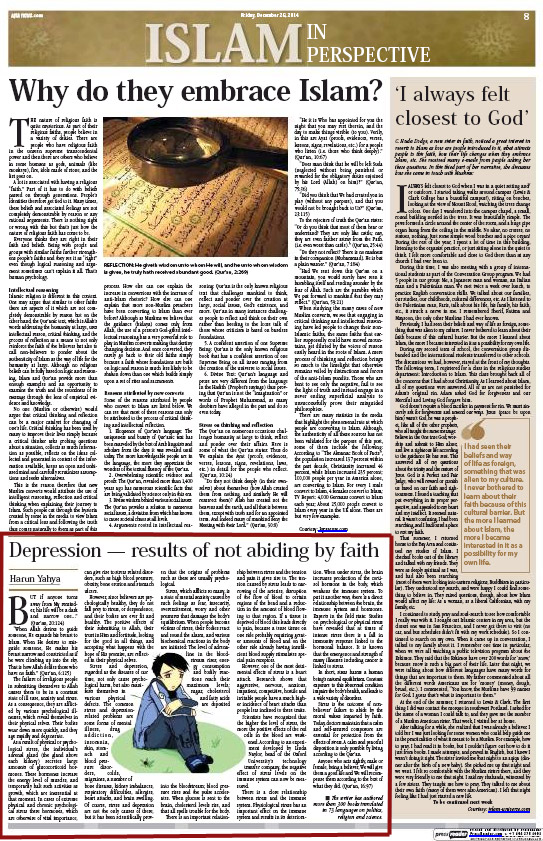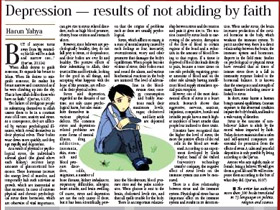
"But if anyone turns away from My reminder, his life will be a dark and narrow one...” (Qur’an, 20:124)
“When Allah desires to guide someone, He expands his breast to Islam. When He desires to misguide someone, He makes his breast narrow and constricted as if he were climbing up into the sky. That is how Allah defiles those who have no faith.” (Qur’an, 6:125)
The failure of irreligious people in submitting themselves to Allah causes them to be in a constant state of ill ease, anxiety and stress. As a consequence, they are afflicted by various psychological illnesses, which reveal themselves in their physical selves. Their bodies wear down more quickly, and they age rapidly and degenerate.
As a result of physical or psychological stress, the individual’s adrenal gland (the gland above each kidney) secretes large amounts of glucocorticoid hormones. These hormones increase the energy level of muscles, and temporarily halt such activities as growth, which are inessential at that moment. In cases of extreme physical and chronic psychological stress these hormones, which are otherwise of vital importance, can give rise to stress related disorders, such as high blood pressure, obesity, bone erosion and stomach ulcers.
However, since believers are psychologically healthy, they do not fall prey to stress, or despondence, and their bodies are ever fit and healthy. The positive effects of their submitting to Allah, their trust in Him and fortitude, looking for the good in all things, and accepting what happens with the hope of His promise, are reflected in their physical selves.
Stress and depression, regarded as the diseases of our time, not only cause psychological harm, but also manifests themselves in various physical defects. The common stress and depression-related problems are some forms of mental illness, drug addiction, insomnia, skin, stomach and blood pressure disorders, colds, migraines, a number of bone diseases, kidney imbalances, respiratory difficulties, allergies, heart attacks, and brain swelling. Of course, stress and depression are not the only causes of these, but it has been scientifically proven that the origins of problems such as these are usually psychological.
Stress, which afflicts so many, is a state of mental anxiety caused by such feelings as fear, insecurity, overexcitement, worry and other pressures that damages the body’s equilibrium. When people become victims of stress, their bodies react and sound the alarm, and various biochemical reactions in the body are initiated: The level of adrenaline in the bloodstream rises; energy consumption and bodily reactions reach their maximum levels; sugar, cholesterol and fatty acids are deposited into the bloodstream; blood pressure rises and the pulse accelerates. When glucose is sent to the brain, cholesterol levels rise, and that all spells trouble for the body.
There is an important relationship between stress and the tension and pain it gives rise to. The tension caused by stress leads to narrowing of the arteries, disruption of the flow of blood to certain regions of the head and a reduction in the amount of blood flowing to that region. If a tissue is deprived of blood this leads directly to pain, because a tense tissue on one side probably requiring greater amounts of blood and on the other side already having insufficient blood supply stimulates special pain receptors.
However, one of the most detrimental effects of stress is a heart attack. Research shows that aggressive, nervous, anxious, impatient, competitive, hostile and irritable people have a much higher incidence of heart attacks than people less inclined to these traits.
Scientists have recognized that the higher the level of stress, the more the positive effects of the red cells in the blood are weakened. According to an experiment developed by Linda Naylor, head of the Oxford University’s technology transfer company, the negative effect of stress levels on the immune system can now be measured.
There is a close relationship between stress and the immune system. Physiological stress has an important effect on the immune system and results in its deterioration. When under stress, the brain increases production of the cortisol hormone in the body, which weakens the immune system. To put it another way, there is a direct relationship between the brain, the immune system and hormones. Experts in the field state: Studies on psychological or physical stress have revealed that at times of intense stress there is a fall in immunity response linked to the hormonal balance. It is known that the emergence and strength of many illnesses including cancer is linked to stress.
In short, stress harms a human being’s natural equilibrium. Constant exposure to this abnormal condition impairs the body’s health, and leads to a wide variety of disorders.
Stress is the outcome of non-believers’ failure to abide by the moral values imparted by faith. Today, doctors maintain that a calm and self-assured composure are essential for protection from the effects of stress. A calm and peaceful disposition is only possible by living according to the Qur’an.
Anyone who acts rightly, male or female, being a believer, We will give them a good life and We will recompense them according to the best of what they did. (Qur’an, 16:97)
Adnan Oktar's piece on Arab News:


